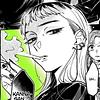Take a photo of a barcode or cover
Essentially a collection of short folk tales, I especially liked "The Story of Mimi-Nashi-Houichi" and "The Dream of Akinosuke". I don't know that I'd say the others were bad necessarily, just forgettable.
When Hearn writes in his own voice instead of acting as a translator, though, it gets a little troubling. Toward the end of the book is a treatise on the superior moral evolution of ants, with extensive quotations from Herbert Spencer. Hearn confesses to "worshipfully reverence [Spencer] as the greatest philosopher who has yet appeared in this world". Spencer, for those who aren't familiar, is largely known for pseudoscientific justifications of racism by way of applying Darwin's theories of evolution to the social sciences.
When Hearn writes in his own voice instead of acting as a translator, though, it gets a little troubling. Toward the end of the book is a treatise on the superior moral evolution of ants, with extensive quotations from Herbert Spencer. Hearn confesses to "worshipfully reverence [Spencer] as the greatest philosopher who has yet appeared in this world". Spencer, for those who aren't familiar, is largely known for pseudoscientific justifications of racism by way of applying Darwin's theories of evolution to the social sciences.
dark
emotional
mysterious
sad
tense
medium-paced
adventurous
funny
hopeful
informative
mysterious
reflective
medium-paced
Plot or Character Driven:
N/A
Strong character development:
N/A
Loveable characters:
N/A
Diverse cast of characters:
N/A
Flaws of characters a main focus:
N/A
For me this is a really different book. It is a series of short vignettes based on Japanese folk tales or stories he claims he heard from some guy in another village. Hearn was born in Greece, grew up mostly in Britain before moving to the US and became the writer who invented New Orleans. In the 1890's ,he moved to Japan, converted to Buddhism, married a Japanese woman and became a naturalized Japanese (not easy to do). He wrote a series of books about old Japan for Westerners. The stories 'Kwaiden" are quite different from the folk tales I grew up with. One that stands out to me was about a Samurai who committed seppuku so an old cherry tree he loved could live. There is an odd insect section tacked on to the end. His explanation of mosquitoes being the return of hungry ghosts of greedy people makes sense to me.
Some excellent, atmospheric ghost stories. Enjoyed the somewhat florid language. Was intrigued about the book after watching the film adaptation.
I ended up having to dnf. I was taking ages to read these fairly small stories. Some were interesting! But others were dull, and a fair few had some bizarre endings. I would've probably kept going, because I do like Japanese folk/creepy/fantasy stories, but I saw that half the book was dedicated to essays about butterflies, ants and mosquito's. I can't be bothered, basically. My interest was wavering anyway and those essays just seem very off topic.
dark
informative
mysterious
medium-paced
dark
emotional
informative
mysterious
sad
fast-paced
Plot or Character Driven:
Plot
Strong character development:
No
Loveable characters:
Yes
Diverse cast of characters:
Yes
Flaws of characters a main focus:
Complicated
I thoroughly enjoyed the stories, but maybe my favourite part was the Insect Studies section, where Hearn goes into the folklore surrounding ants, butterflies, and mosquitoes. The book is short, but felt very intense because of the diverse, sometimes dark, sometimes sad, but always beautiful tales. I recommend this read for anyone interested in Japanese Yokai.
adventurous
dark
slow-paced
Plot or Character Driven:
N/A
Strong character development:
No
Loveable characters:
No
Diverse cast of characters:
No
Flaws of characters a main focus:
No
informative
mysterious
fast-paced
Plot or Character Driven:
N/A
Strong character development:
N/A
Loveable characters:
N/A
Diverse cast of characters:
No
Flaws of characters a main focus:
N/A
medium-paced
This was mostly fairy tales and myths with a few oddball insect musings. These were some of the myths that ignited my fascination with Japanese Culture back in the early '90s.










